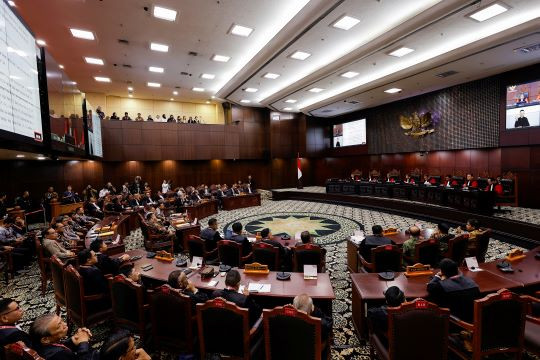An insidious proposal
If passed, the revised law will not bode well for the already tarnished image of the Constitutional Court; not after a spate of high-profile controversies in an election year that saw all members of the bench get slapped with ethical misconduct.
Change Size
 Judgement day: The justices of the Constitutional Court read out decisions on April 22, 2024, on two challenges to the outcome of the February presidential election. The court rejected the losing candidates’ demands for a revote, thereby upholding the victory of president-elect Prabowo Subianto. (Reuters/Willy Kurniawan)
Judgement day: The justices of the Constitutional Court read out decisions on April 22, 2024, on two challenges to the outcome of the February presidential election. The court rejected the losing candidates’ demands for a revote, thereby upholding the victory of president-elect Prabowo Subianto. (Reuters/Willy Kurniawan)
T
he government and the House of Representatives endorsed this week a plan to revise the Constitutional Court Law for a fourth time, which, in no uncertain terms, exposes the court justices to more political interference.
The draft revision, if passed, will limit a justice’s tenure from 15 to 10 years and add a requirement that they seek approval from their appointing institution to continue serving on the bench five years into their tenure.
It essentially gives the appointing institutions – the Office of the President, the House and the Supreme Court – an outlet to express buyer’s remorse over any sitting justice.
And this is without even specifying how one may go about evaluating a justice’s accomplishments, which is inextricably tied to the court– a place where neither politics nor public opinion ought to have any sway.
According to the existing rules introduced in a 2020 revision, an appointed court justice can serve a maximum 15-year term without interruption.
At the time it was instituted, the prevailing wisdom was that 15 years would be enough to insulate justices from political pressure and provide continuity to the court in playing a key role in the checks and balance system.
This week’s flip-flop therefore took many by surprise, given that only in December, Mahfud MD, a former Constitutional Court chief justice who at the time was still serving as the coordinating minister for political, legal and security affairs, refused to green-light the law’s revision.
It was his successor, Hadi Tjahjanto, a close aide of President Joko “Jokowi” Widodo, who cleared a path for the draft bill to be endorsed for passage in a future House plenary meeting.
And like most draft legislation introduced during Jokowi’s increasingly oligarchic reign, it was fast-tracked by lawmakers away from the public eye as the House was in recess.
If and when it is passed, the revised law will not bode well for the already tarnished image of the Constitutional Court; not after a spate of high-profile controversies in an election year that saw all members of the bench get slapped with ethical misconduct.
The court, tasked with adjudicating election disputes and matters concerning the Constitution, was misappropriated by Jokowi’s brother-in-law to alter requirements to run in the presidential election, allowing Jokowi’s son, Gibran Rakabuming Raka, a chance to become vice president.
Gibran’s uncle Anwar Usman, the chief justice, was later demoted, while the other justices were punished because they collectively failed to respond to what an ad hoc probe described as a “gross ethics violation”.
That incident alone spoiled the court’s image as an august institution not beholden to intervention – by the time the election dispute period came around, many people had lost faith in the court’s independence.
On Tuesday, Mahfud made a video statement explaining that while he previously refused to back the revision, the threat of political pressure from the elections has subsided, making it okay to pursue.
We must heartily object and argue that the threat still very much remains, considering that the 2024 simultaneous regional elections will take place later this year, and that even more political interests are at stake.
The proposed revisions also do not address the underlying problems in the judicial selection process, most notably the absence of transparency standards that regulate the process at the level of the appointing institutions.
So why must we stand aside and allow for changes that do nothing to restore the credibility of the court? Politicians have systematically undermined institutions such as the Corruption Eradication Commission (KPK) and the trifecta of election bodies. We cannot risk a reversal of the Reform Era.
Lawmakers have revised the same law three times since the court was established two decades ago. If this is what the face of “rule of law” in Indonesia looks like going forward, then we certainly have reason to fear for our democratic institutions.